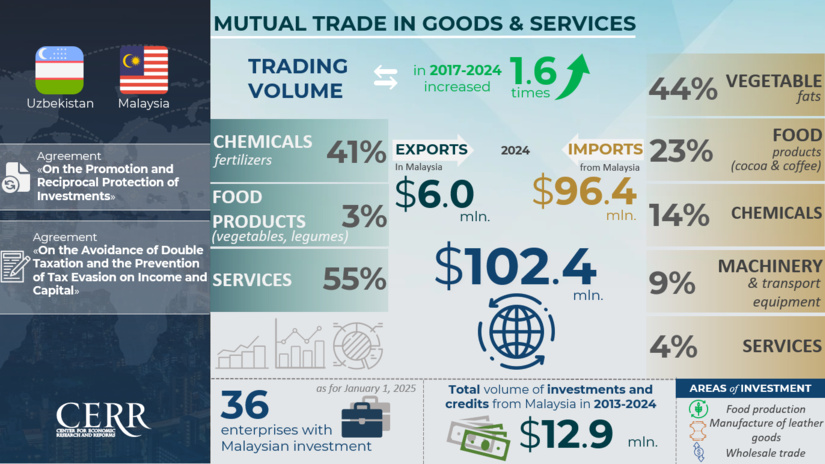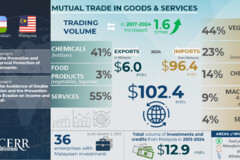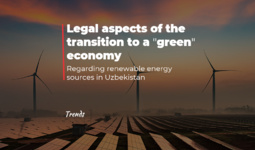President of the Republic of Uzbekistan Shavkat Mirziyoyev, at the invitation of the Prime Minister of Malaysia Anwar Ibrahim, departed for Malaysia today on an official visit.
The Center for Economic Research and Reforms (CERR) has analyzed trade-economic and investment cooperation between Uzbekistan and Malaysia for the 2017–2024 period.
Dynamics of Relationship Development
In recent years, the trade-economic cooperation between Uzbekistan and Malaysia has been actively developing, which is confirmed by the increase in trade turnover and active interaction in various sectors of the economy. Since the establishment of diplomatic relations in 1992, the countries have strived to expand their economic ties, which has become especially noticeable in recent years.
Uzbekistan’s Trade with Malaysia
Over the period from 2017 to 2024, trade turnover between Uzbekistan and Malaysia increased by 1.6 times, from $65.5 mln. to $102.4 mln. Exports grew by 1.3 times, while imports increased by 1.6 times. These indicators reflect the growing interest of both countries in expanding mutual trade.
Over the past 8 years, the main commodity items of Uzbekistan’s export to Malaysia were chemical fertilizers and services, while the main items of import were palm oil, animal and vegetable oils, chemical and cleaning agents, food products, finished goods, as well as services.
In 2024, Uzbekistan’s exports amounted to $6 mln., of which 41% accounted for food products, including vegetables, legumes, and fruits, and 55% were chemical substances, in particular fertilizers.
The volume of imports from Malaysia amounted to $96.4 mln., of which 23% accounted for food products such as cocoa powder, coffee extracts, sauces, and confectionery. Animal and vegetable fats, including palm and coconut oils, made up 44%, cleaning agents and alcohol mixtures – 14%. Moreover, machines and transport equipment comprised 9% of imports, transport services – 4%, and medical products – 2.1%.
Investment Cooperation
Investment cooperation between Uzbekistan and Malaysia demonstrates significant potential for growth and development. As of January 1, 2025, 36 enterprises with Malaysian investments were registered in Uzbekistan, indicating a growing interest in the Uzbek market.
Over the period 2017–2024, the total volume of direct foreign investments and credits from Malaysia in Uzbekistan amounted to $12.9 mln.
Conclusion
Trade-economic cooperation between Uzbekistan and Malaysia has significant potential for further development. The growing interest of both countries in mutual trade and investments creates opportunities to strengthen ties in key sectors of the economy. This can contribute to economic development, the creation of new jobs, and an improved standard of living for the population.
For successful cooperation development, it is necessary to apply a comprehensive approach and actively utilize the available opportunities.
CERR Public Relations Sector






















leave a comment